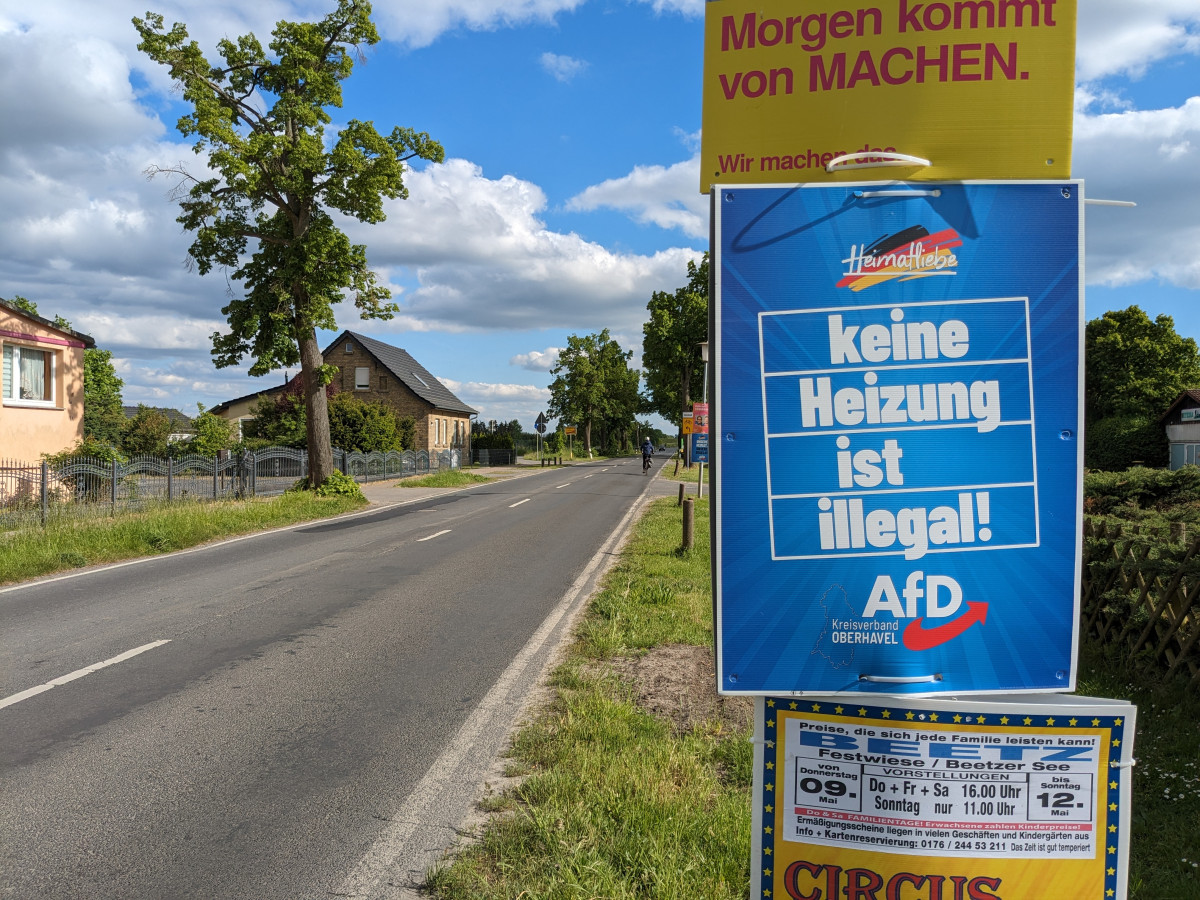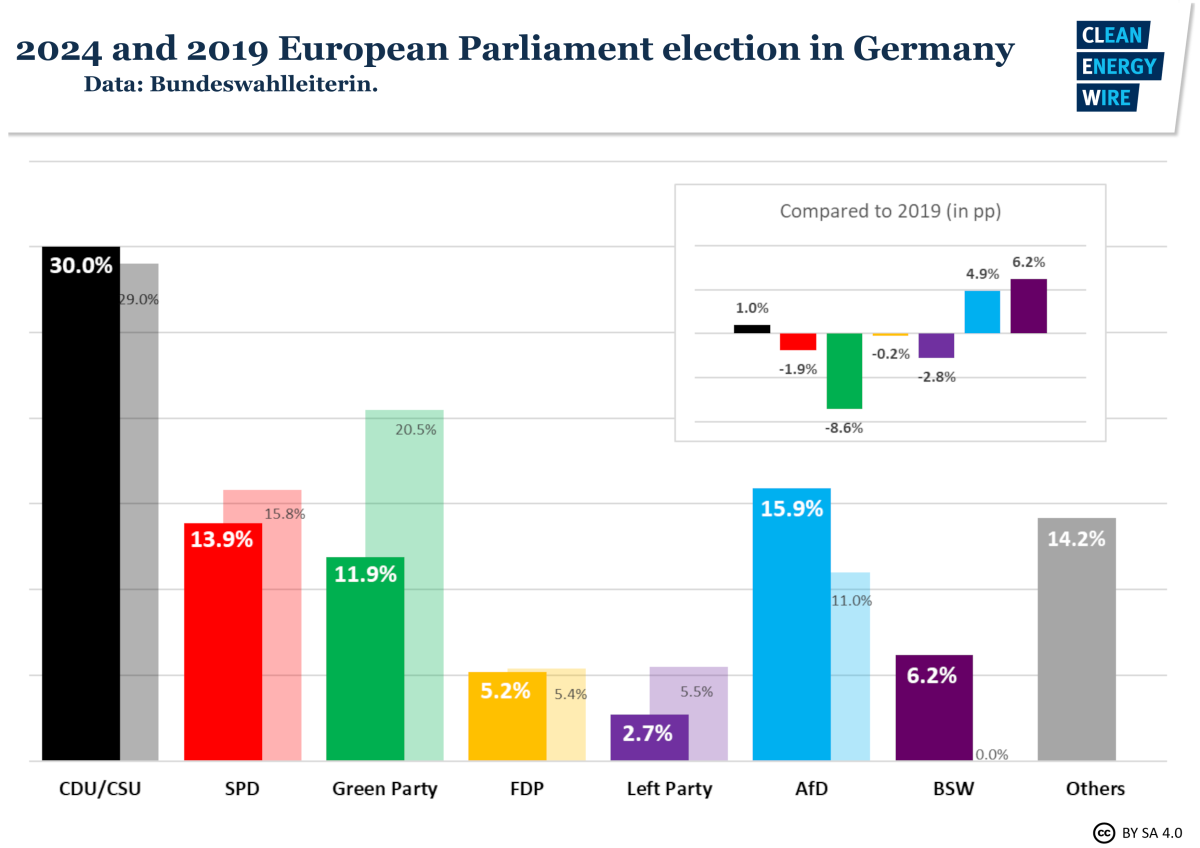EU election defeat bodes ill for German govt’s climate ambitions ahead of state votes
With clear losses incurred by all of Germany’s three coalition parties, the EU elections have been a resounding defeat for the government of Chancellor Olaf Scholz. The chastening results look set to further complicate the work of the beleaguered alliance of his Social Democratic Party (SPD), the Green Party, and the Free Democrats (FDP). The parties - known as Germany’s “traffic light coalition” due to their colours - together only scored slightly more than the opposition conservative CDU/CSU alliance which, with 30 percent of the vote, emerged as the clear winner in Europe’s biggest economy. By contrast, Scholz’s SPD scored just under 13.9 percent and the pro-business FDP about 5.2 percent. The Greens, with 11.9 percent, incurred the greatest loss of all parties compared to the previous EU vote in 2019, dropping 8.6 percentage points.
The coalition parties’ poor showing cleared the path for the far-right Alternative for Germany (AfD) to become the country’s second largest party at the European elections, scoring 15.9 percent. AfD’s success aligns with a shift to the right across Europe that is feared to throw a spanner in the works of the EU’s climate action ambitions. "The party emerged from the election as the big winner," said Jana Puglierin, policy analyst at the European Council on Foreign Relations (ECFR) think tank." If the result of the vote is an indicator for the three state elections in the eastern German federal states in September, the AfD threatens to become the strongest force there," she said in a statement.
The result marks the latest blow in a series of election defeats for the ‘traffic light coalition’ parties and charts a difficult path to the upcoming elections in three eastern German states in September, one year before the next national elections scheduled for late 2025. Most voters in Germany still regard a successful energy transition and effective climate action as key policy aims for their government, but the European energy crisis and Germany’s sluggish economic performance in the past two years increased worries among many citizens about the costs and other consequences of emissions reduction policies that the coalition has so far struggled to alleviate. With immigration and European security dominating the list of concerns of most citizens, the parties had already shifted the focus away from climate action in their campaigns. The EU election defeat could mean the coalition - which set out to rapidly increase Germany’s renewable power share and spur the transition across the economy - could slow down its climate policy drive.
SPD co-leader Lars Klingbeil singled out the controversial heating law for making people feel insecure: “This was too much too fast,” Klingbeil said in an interview with n-tv. “It has led the coalition to lose people and we are aware that it has cost us a lot of trust.” Last year, opposition parties and parts of the media seized on plans for heating decarbonisation by Green Party economy minister Robert Habeck to accuse the government of hurting citizens with an overly ambitious policy. A conclusion drawn from the heating law controversy for his party would be that “you cannot push ahead the ecologic side of things without safeguarding the social side” and make sure that people are not afraid of the required changes. But Klingbeil added: “This does not at all mean we should hit the brakes on climate action or say we no longer care about it.” Many voters expected the government to hold the course on decarbonisation, even though the ill-designed heating law would have to serve as a reminder that this must be done with a lot of care.
This insight could be tested in upcoming debates on the country’s 2025 budget, which the SPD leader already predicted will become “difficult”, not least because of the country’s ‘debt brake’ ruling on limits to government borrowing that rocked the coalition in late 2023. FDP leader and finance minister Christian Lindner had upset his coalition partners shortly before the election by thwarting hopes that his party could support a softening of the debt brake and instead insisted that cuts be made to social security payments, pensions, and energy transition support. In an interview with tabloid Bild, Lindner had warned the SPD and the Greens would have to find partners “other than the FDP” if they insist on greater public spending. "All parties are fighting for every vote with a view to the three state elections and the federal elections next year. It is to be feared that the frictions within the coalition will intensify further, especially in view of the current budget negotiations," said ECFR analyst Puglierin.
Election winner CDU ready to undo parts of EU climate agreements
Even though the Green Party suffered the smallest losses of all government parties compared to the national elections in 2021, party co-leader Omid Nouripour said the Greens had had “different ambitions” that were clearly missed at the EU elections. “We must think hard about what we can do differently,” Nouripour said in an interview with public broadcaster ZDF. He said the party’s poor showing among young voters in Germany, for whom the Greens had campaigned successfully to lower the voting age, is alarming for a party whose stated aim is to protect the environment for future generations. In the age group of 16 to 24 year olds, the Greens came in third with 11 percent, behind the conservative CDU/CSU and the AfD, who both scored 17 percent among youngsters and first-time voters. Nouripour stressed that his party must not react by lowering emission reduction targets.
CDU leader Friedrich Merz said the results for Germany’s government coalition showed that voters used the European elections “to teach a lesson”. The EU-wide success of conservative parties, including Germany’s CDU, lifts the prospects of a second term for European Commission leader Ursula von der Leyen, who hails from the Christian Democrats. Simultaneously, the results undermine the authority of Scholz, whose SPD faced its worst-ever result in a nationwide election. Consequently, Merz called on the government to “change course” in key policy areas such as industrial policy or migration. The CDU leader, in a debate on news station n-tv, added that his party would seek to initiate changes to European climate policy by shooting down the agreed 2035 ban on new combustion engine cars, which was intended as part of the EU Green Deal. The deal, aiming to prepare the EU for climate neutrality by 2050, was championed by Merz’s fellow CDU member Von der Leyen and could see a drop in ambition under the next European Commission, even if its core tenets are likely to remain intact. Already in the EU Parliament's current term, "legislation on climate and environmental protection, such as the recent Nature Restoration Law, could only just be pushed through," said Jana Puglierin. "This will become even more difficult in the future," she argued.
The CDU’s secretary general, Carsten Linnemann, said Scholz should call for a vote of confidence in parliament and open the door for new elections. “Never before has a chancellor’s party received only 14 percent,” Linneman said in an interview with news station Phoenix. Scholz and his government had to ask themselves whether they can lay claim to leading the country, he added. In a different interview with ZDF, Linnemann also blamed the heating law for costing the government dearly in terms of voter confidence. He singled out the government’s performance as a main factor for the AfD’s success – which his CDU had failed to fend off despite Merz’s ambition to “halve” the populists’ results.
However, at least for now, Scholz has ruled out to follow the example of French president Emmanuel Macron and call a snap election. Faced with an even greater rightiwing populist victory, Macron announced that a new parliament would be elected by July after his party was clearly beaten by the rightwing populist Rassemblement National (RN). None of the parties in Germany’s ‘traffic light coalition’ stand to gain from such a step and the risks would be high. However, the state elections held in eastern states Thuringia, Saxony, and Brandenburg could further increase pressure on the government to rethink its approach for the rest of its term. At the EU elections, the AfD did not score as well as it did in polls earlier this year after a series of scandals implicating senior party members. However, the anti-climate action party turned out to be the strongest force in all of eastern Germany – and also turned out as the strongest party in parallel municipal elections in several eastern states.
Together with leftwing-populist newcomer party BSW, led by former Left Party member Sarah Wagenknecht, the AfD gained over 40 percent of the votes in the formerly communist region, with all of the three government parties becoming increasingly marginalised in East Germany. Like the AfD, the BSW has heavily attacked the country’s longstanding commitment to the energy transition and renewable power. Both populist parties instead call for re-entering into full energy trading with Russia and openly question the approach of the EU and NATO to contain and halt Russia’s war on Ukraine. Scholz recently stressed that the eastern states have widely embraced the energy transition to their own benefit. So far, it appears many voters in the east still need to be convinced of this interpretation before September.



